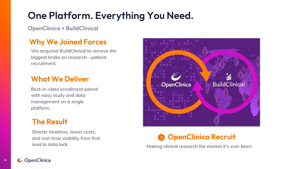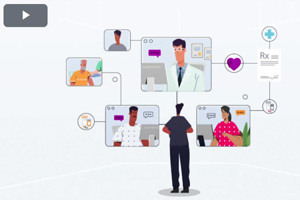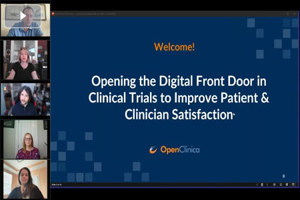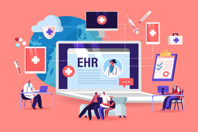
ABOUT OPENCLINICA
OpenClinica makes clinical trials more efficient and effective with advanced technology and recruitment solutions. Our industry-leading EHR-to-EDC connectivity automates source data acquisition, reduces errors, and eliminates delays, while our precision recruitment solutions help teams enroll the right participants with ease.
Trusted by the world’s leading life sciences companies, academic institutions, and government agencies, OpenClinica bridges the gap between healthcare and research. Our technology has powered over 15,000 studies and supported more than three million patients worldwide.
From biotech startups to global pharma, research teams rely on OpenClinca to run more efficient clinical trials and bring new treatments to patients faster.
NEWS FROM OPENCLINICA
-
OpenClinica Named Top Contender In Electronic Data Capture (EDC) Platforms By Everest Group12/13/2024
Everest Group, a leading global research and consulting firm, named OpenClinica a Major Contender in its Life Sciences Electronic Data Capture (EDC) Products PEAK Matrix® Assessment for 2024. The inaugural assessment evaluated 20 best-in-class EDCs based on the impact created in the market and the ability to deliver products successfully. OpenClinica differentiates itself from other EDCs with its vision and capability, earning high marks in technology capability, flexibility and ease of deployment, engagement and commercial model, and customer support.
-
OpenClinica Debuts Secure, Participant-Friendly Mobile App For Direct Health Record Sharing In Clinical Research12/13/2024
OpenClinica Share™ simplifies the sharing of real-world and complex medical data for clinical research by participants.
-
OpenClinica Acquires BuildClinical to Accelerate Patient Recruitment12/10/2024
OpenClinica today announced its acquisition of BuildClinical, a health technology company that helps researchers and patients find each other faster. BuildClinical uses advanced data-driven strategies to engage and enroll the ideal clinical trial population needed for a given study. Since its founding in 2020, BuildClinical has successfully enrolled more than 50,000 participants in clinical research studies, while simultaneously accelerating enrollment timelines and reducing participant engagement costs.
CONTACT INFORMATION
OpenClinica
1075 Main Street Suite #140
Waltham, MA 02451
UNITED STATES
Phone: (617) 621-8585
HOT PRODUCTS
-
Clinical trial recruitment solution: Get the right participants for your clinical research study easier and faster than ever before.
-
Discover why more life science teams are using OpenClinica Unite™ to automate source data acquisition from patient medical record systems to clinical trial research databases and case report forms.
FEATURED ARTICLES
-
Effective patient recruitment starts with trust. Leading trials build lasting relationships and prioritize respect, simplicity, and community engagement to overcome enrollment challenges.
-
Clinical research teams thrive in the Flow State, where systems align, data connects, and work becomes purposeful, not painful. Ease is clarity, not complexity.
-
Tool sprawl in clinical trials creates hidden inefficiencies, fractured collaboration, and delayed insights. Unified systems restore flow, clarity, and control across research teams and functions.
-
Federal funding shifts in 2025 are impacting clinical research, with budget cuts and political scrutiny slowing innovation and threatening diversity in trial participation.
-
Top-performing clinical trials treat recruitment as a science — thinking like patients, acting fast, and engaging communities with intention, not outdated tactics like bulletin board flyers.
-
CISCRP’s 2025 survey reveals key clinical trial insights: altruism drives participation, trust in pharma lags, and most are comfortable with AI analyzing medical data.
-
From digital-first engagement to data transparency and community trust-building, consider this roadmap for transforming patient recruitment into a repeatable, measurable engine for trial success.
-
SCDM 2025 spotlighted six key shifts in clinical data management — from explainable AI to ICH-M11 — offering actionable strategies for teams embracing digital transformation.
-
When systems align and tools support your work, clinical research enters a flow state — where clarity replaces chaos and progress feels natural, connected, and confidently under control.
-
Learn how EHR-to-EDC integration can streamline clinical trials, boosting accuracy, efficiency, and compliance.
-
Artificial intelligence (AI) is rapidly transforming clinical research, with innovative applications in key areas such as real-world evidence generation, regulatory submissions, and biomarker discovery.
-
Clinical trial recruitment is increasingly digital. Learn about the ethical considerations and how transparency and trust lead to better outcomes.
-
Despite frequent data breaches, patients remain willing to share their health data with trusted healthcare providers that prioritize transparency and ethical stewardship.
-
When data is missing or delayed, it can slow down trial progress. Improving EHR data quality strengthens clinical research and ensures faster access to life-changing therapies for patients in need.
-
Audit trails are not only a regulatory necessity but a strategic tool to ensure data reliability and accelerate high-quality clinical research outcomes.
-
By pairing proven practices with modern technology, trials reduce start-up delays, cut costs, and ensure treatments reach patients faster.
-
A clinical data management system (CDMS) is essential for ensuring efficiency, accuracy, and compliance in clinical trials by streamlining how data is collected, validated, stored, and reported.
-
Adaptive platform trials (APTs) are reshaping clinical research by enabling multiple therapies to be tested simultaneously under a single, flexible protocol.
-
Explore a powerful yet accessible EDC solution that enables faster, more efficient study builds without compromising data integrity or compliance, allowing clinical teams to focus on advancing research outcomes.
-
The I-SPY 2 Trial represents a groundbreaking approach in oncology, with a key component of the trial's success being the integration of EHR with EDC via OpenClinica's Unite platform.




































